Tesco Organisational Behaviour: Influences, Theories & Philosophies
VerifiedAdded on 2023/06/05
|12
|4376
|294
Report
AI Summary
This report provides an analysis of organisational behaviour, using Tesco as a case study. It explores the influence of culture, politics, and power on individual and team behaviour, evaluating how these factors impact performance. The report assesses process and content theories of motivation, including Maslow's hierarchy of needs, and discusses different types of teams and effective team theories. Furthermore, it applies various organisational behaviour concepts and philosophies, investigating their impact on behaviour within the organisation. The analysis aims to provide insights into managing and improving organisational dynamics to enhance productivity and employee satisfaction at Tesco.
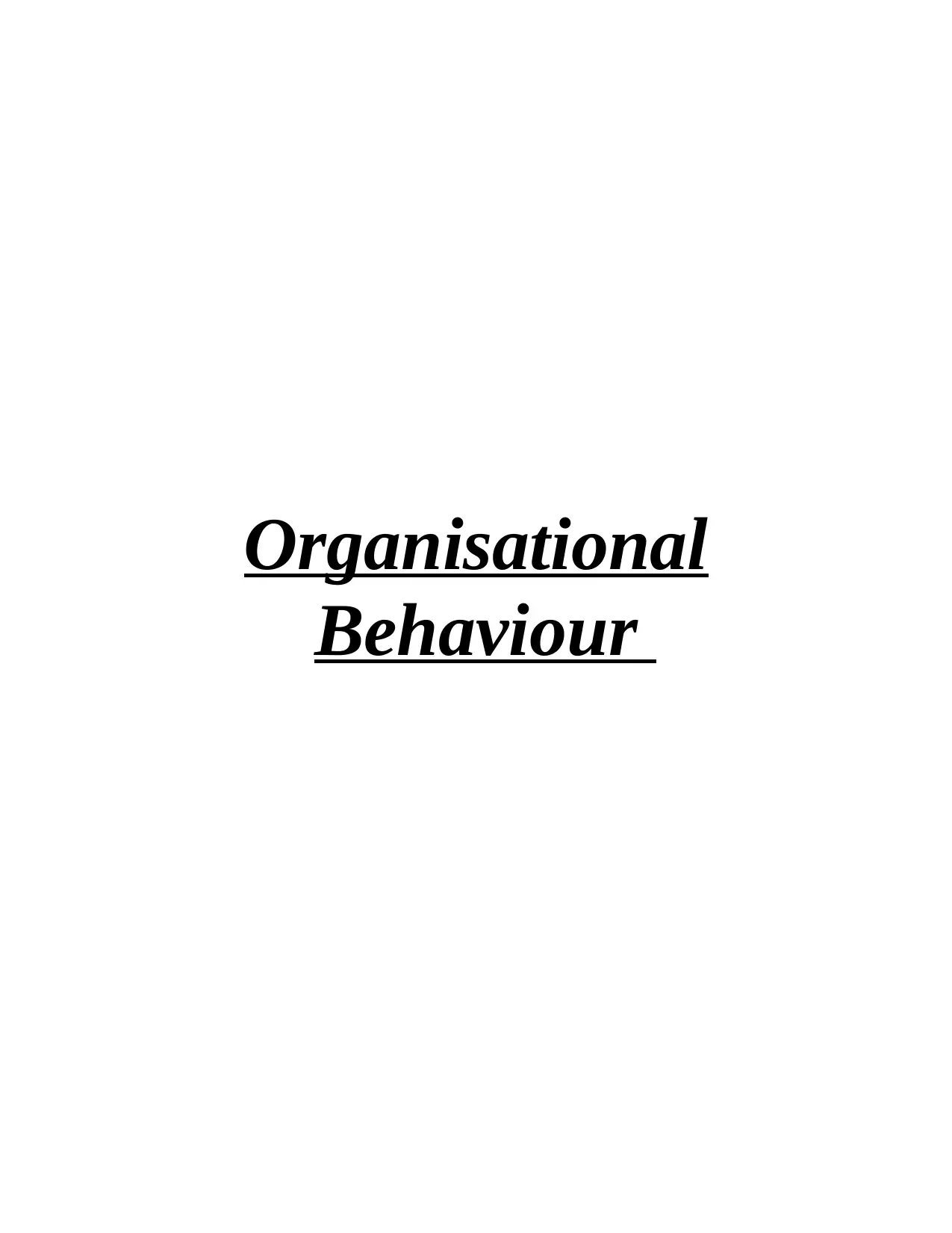
Organisational
Behaviour
Behaviour
Paraphrase This Document
Need a fresh take? Get an instant paraphrase of this document with our AI Paraphraser
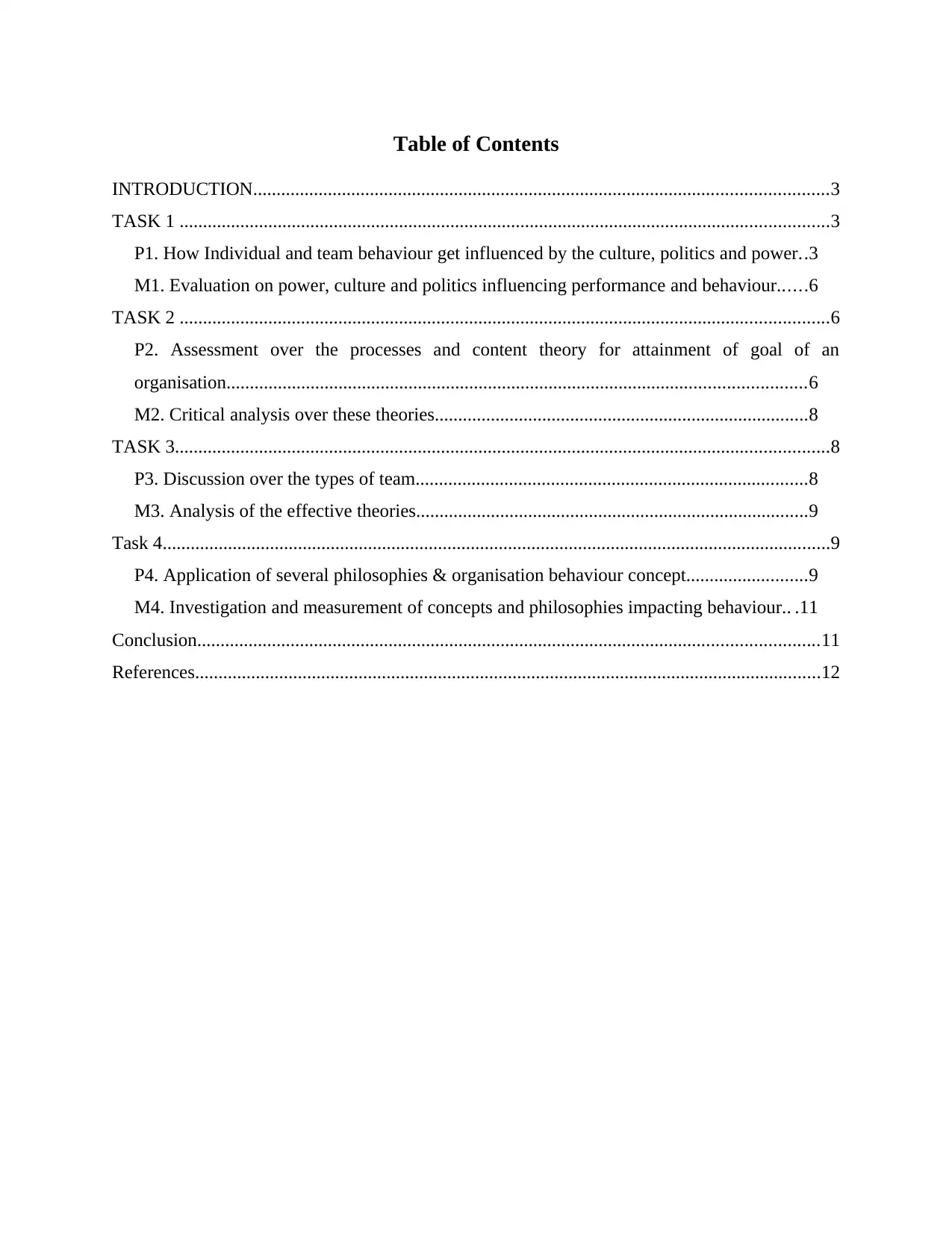
Table of Contents
INTRODUCTION...........................................................................................................................3
TASK 1 ...........................................................................................................................................3
P1. How Individual and team behaviour get influenced by the culture, politics and power..3
M1. Evaluation on power, culture and politics influencing performance and behaviour......6
TASK 2 ...........................................................................................................................................6
P2. Assessment over the processes and content theory for attainment of goal of an
organisation............................................................................................................................6
M2. Critical analysis over these theories................................................................................8
TASK 3............................................................................................................................................8
P3. Discussion over the types of team....................................................................................8
M3. Analysis of the effective theories....................................................................................9
Task 4...............................................................................................................................................9
P4. Application of several philosophies & organisation behaviour concept..........................9
M4. Investigation and measurement of concepts and philosophies impacting behaviour.. .11
Conclusion.....................................................................................................................................11
References......................................................................................................................................12
INTRODUCTION...........................................................................................................................3
TASK 1 ...........................................................................................................................................3
P1. How Individual and team behaviour get influenced by the culture, politics and power..3
M1. Evaluation on power, culture and politics influencing performance and behaviour......6
TASK 2 ...........................................................................................................................................6
P2. Assessment over the processes and content theory for attainment of goal of an
organisation............................................................................................................................6
M2. Critical analysis over these theories................................................................................8
TASK 3............................................................................................................................................8
P3. Discussion over the types of team....................................................................................8
M3. Analysis of the effective theories....................................................................................9
Task 4...............................................................................................................................................9
P4. Application of several philosophies & organisation behaviour concept..........................9
M4. Investigation and measurement of concepts and philosophies impacting behaviour.. .11
Conclusion.....................................................................................................................................11
References......................................................................................................................................12
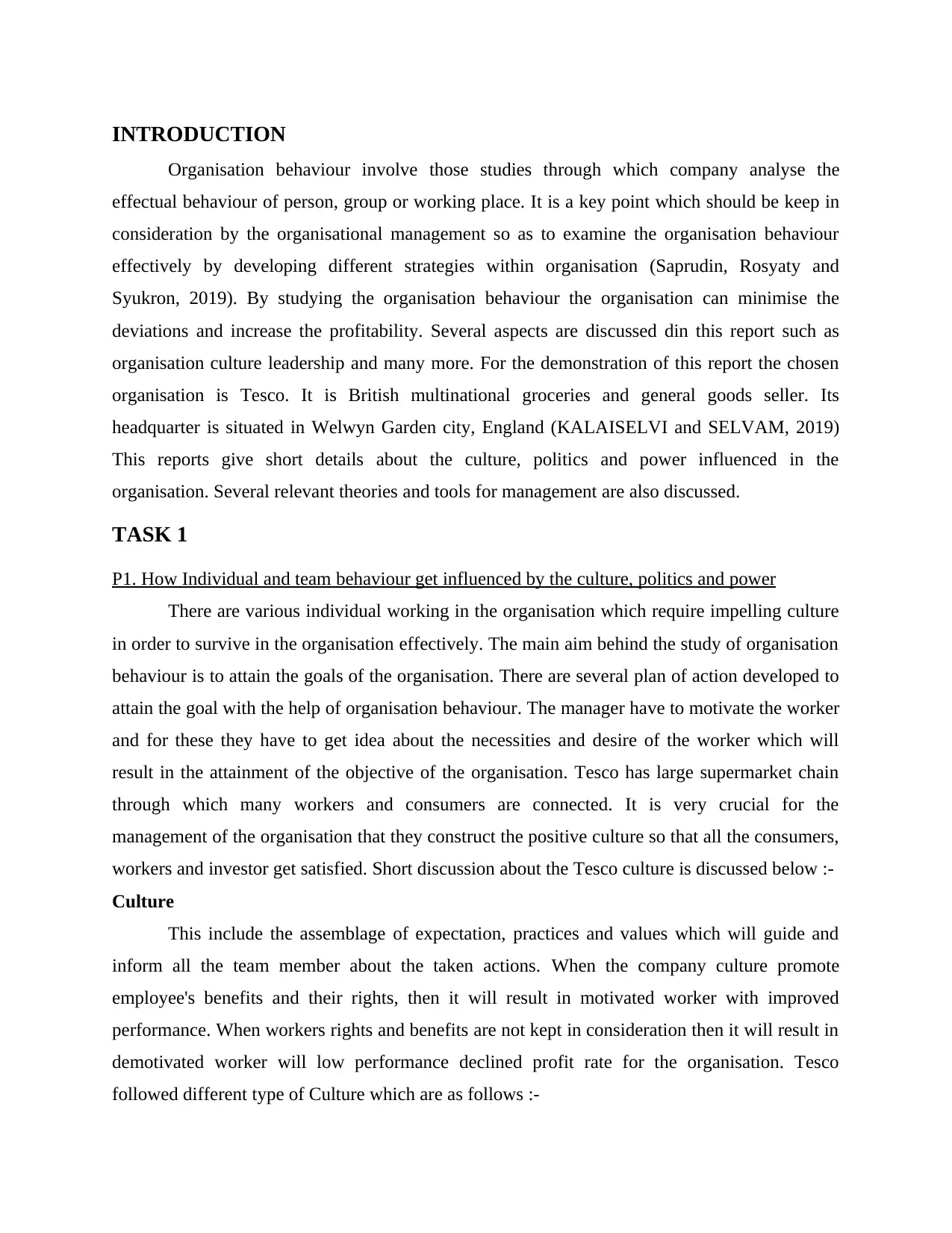
INTRODUCTION
Organisation behaviour involve those studies through which company analyse the
effectual behaviour of person, group or working place. It is a key point which should be keep in
consideration by the organisational management so as to examine the organisation behaviour
effectively by developing different strategies within organisation (Saprudin, Rosyaty and
Syukron, 2019). By studying the organisation behaviour the organisation can minimise the
deviations and increase the profitability. Several aspects are discussed din this report such as
organisation culture leadership and many more. For the demonstration of this report the chosen
organisation is Tesco. It is British multinational groceries and general goods seller. Its
headquarter is situated in Welwyn Garden city, England (KALAISELVI and SELVAM, 2019)
This reports give short details about the culture, politics and power influenced in the
organisation. Several relevant theories and tools for management are also discussed.
TASK 1
P1. How Individual and team behaviour get influenced by the culture, politics and power
There are various individual working in the organisation which require impelling culture
in order to survive in the organisation effectively. The main aim behind the study of organisation
behaviour is to attain the goals of the organisation. There are several plan of action developed to
attain the goal with the help of organisation behaviour. The manager have to motivate the worker
and for these they have to get idea about the necessities and desire of the worker which will
result in the attainment of the objective of the organisation. Tesco has large supermarket chain
through which many workers and consumers are connected. It is very crucial for the
management of the organisation that they construct the positive culture so that all the consumers,
workers and investor get satisfied. Short discussion about the Tesco culture is discussed below :-
Culture
This include the assemblage of expectation, practices and values which will guide and
inform all the team member about the taken actions. When the company culture promote
employee's benefits and their rights, then it will result in motivated worker with improved
performance. When workers rights and benefits are not kept in consideration then it will result in
demotivated worker will low performance declined profit rate for the organisation. Tesco
followed different type of Culture which are as follows :-
Organisation behaviour involve those studies through which company analyse the
effectual behaviour of person, group or working place. It is a key point which should be keep in
consideration by the organisational management so as to examine the organisation behaviour
effectively by developing different strategies within organisation (Saprudin, Rosyaty and
Syukron, 2019). By studying the organisation behaviour the organisation can minimise the
deviations and increase the profitability. Several aspects are discussed din this report such as
organisation culture leadership and many more. For the demonstration of this report the chosen
organisation is Tesco. It is British multinational groceries and general goods seller. Its
headquarter is situated in Welwyn Garden city, England (KALAISELVI and SELVAM, 2019)
This reports give short details about the culture, politics and power influenced in the
organisation. Several relevant theories and tools for management are also discussed.
TASK 1
P1. How Individual and team behaviour get influenced by the culture, politics and power
There are various individual working in the organisation which require impelling culture
in order to survive in the organisation effectively. The main aim behind the study of organisation
behaviour is to attain the goals of the organisation. There are several plan of action developed to
attain the goal with the help of organisation behaviour. The manager have to motivate the worker
and for these they have to get idea about the necessities and desire of the worker which will
result in the attainment of the objective of the organisation. Tesco has large supermarket chain
through which many workers and consumers are connected. It is very crucial for the
management of the organisation that they construct the positive culture so that all the consumers,
workers and investor get satisfied. Short discussion about the Tesco culture is discussed below :-
Culture
This include the assemblage of expectation, practices and values which will guide and
inform all the team member about the taken actions. When the company culture promote
employee's benefits and their rights, then it will result in motivated worker with improved
performance. When workers rights and benefits are not kept in consideration then it will result in
demotivated worker will low performance declined profit rate for the organisation. Tesco
followed different type of Culture which are as follows :-
⊘ This is a preview!⊘
Do you want full access?
Subscribe today to unlock all pages.

Trusted by 1+ million students worldwide
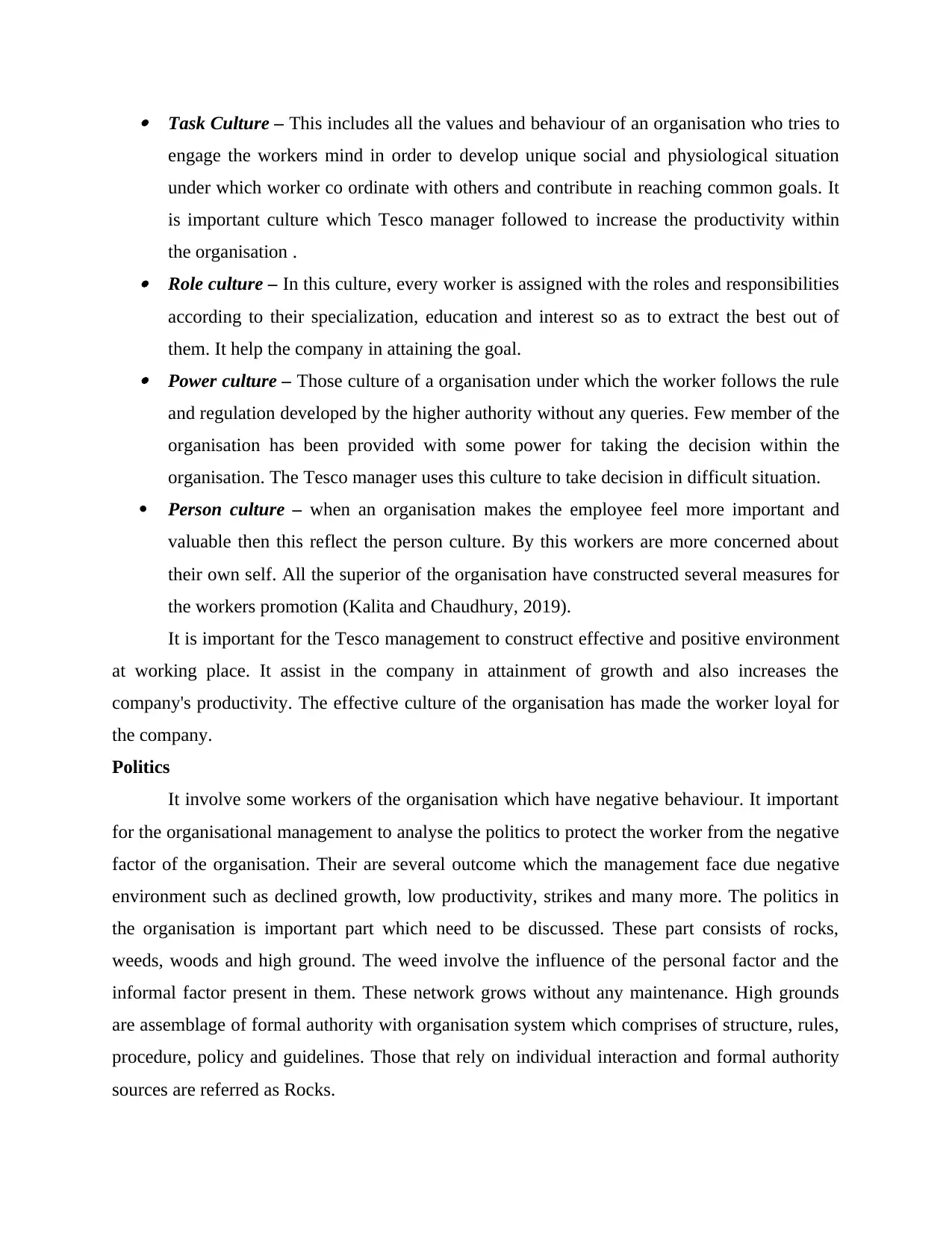
Task Culture – This includes all the values and behaviour of an organisation who tries to
engage the workers mind in order to develop unique social and physiological situation
under which worker co ordinate with others and contribute in reaching common goals. It
is important culture which Tesco manager followed to increase the productivity within
the organisation . Role culture – In this culture, every worker is assigned with the roles and responsibilities
according to their specialization, education and interest so as to extract the best out of
them. It help the company in attaining the goal. Power culture – Those culture of a organisation under which the worker follows the rule
and regulation developed by the higher authority without any queries. Few member of the
organisation has been provided with some power for taking the decision within the
organisation. The Tesco manager uses this culture to take decision in difficult situation.
Person culture – when an organisation makes the employee feel more important and
valuable then this reflect the person culture. By this workers are more concerned about
their own self. All the superior of the organisation have constructed several measures for
the workers promotion (Kalita and Chaudhury, 2019).
It is important for the Tesco management to construct effective and positive environment
at working place. It assist in the company in attainment of growth and also increases the
company's productivity. The effective culture of the organisation has made the worker loyal for
the company.
Politics
It involve some workers of the organisation which have negative behaviour. It important
for the organisational management to analyse the politics to protect the worker from the negative
factor of the organisation. Their are several outcome which the management face due negative
environment such as declined growth, low productivity, strikes and many more. The politics in
the organisation is important part which need to be discussed. These part consists of rocks,
weeds, woods and high ground. The weed involve the influence of the personal factor and the
informal factor present in them. These network grows without any maintenance. High grounds
are assemblage of formal authority with organisation system which comprises of structure, rules,
procedure, policy and guidelines. Those that rely on individual interaction and formal authority
sources are referred as Rocks.
engage the workers mind in order to develop unique social and physiological situation
under which worker co ordinate with others and contribute in reaching common goals. It
is important culture which Tesco manager followed to increase the productivity within
the organisation . Role culture – In this culture, every worker is assigned with the roles and responsibilities
according to their specialization, education and interest so as to extract the best out of
them. It help the company in attaining the goal. Power culture – Those culture of a organisation under which the worker follows the rule
and regulation developed by the higher authority without any queries. Few member of the
organisation has been provided with some power for taking the decision within the
organisation. The Tesco manager uses this culture to take decision in difficult situation.
Person culture – when an organisation makes the employee feel more important and
valuable then this reflect the person culture. By this workers are more concerned about
their own self. All the superior of the organisation have constructed several measures for
the workers promotion (Kalita and Chaudhury, 2019).
It is important for the Tesco management to construct effective and positive environment
at working place. It assist in the company in attainment of growth and also increases the
company's productivity. The effective culture of the organisation has made the worker loyal for
the company.
Politics
It involve some workers of the organisation which have negative behaviour. It important
for the organisational management to analyse the politics to protect the worker from the negative
factor of the organisation. Their are several outcome which the management face due negative
environment such as declined growth, low productivity, strikes and many more. The politics in
the organisation is important part which need to be discussed. These part consists of rocks,
weeds, woods and high ground. The weed involve the influence of the personal factor and the
informal factor present in them. These network grows without any maintenance. High grounds
are assemblage of formal authority with organisation system which comprises of structure, rules,
procedure, policy and guidelines. Those that rely on individual interaction and formal authority
sources are referred as Rocks.
Paraphrase This Document
Need a fresh take? Get an instant paraphrase of this document with our AI Paraphraser
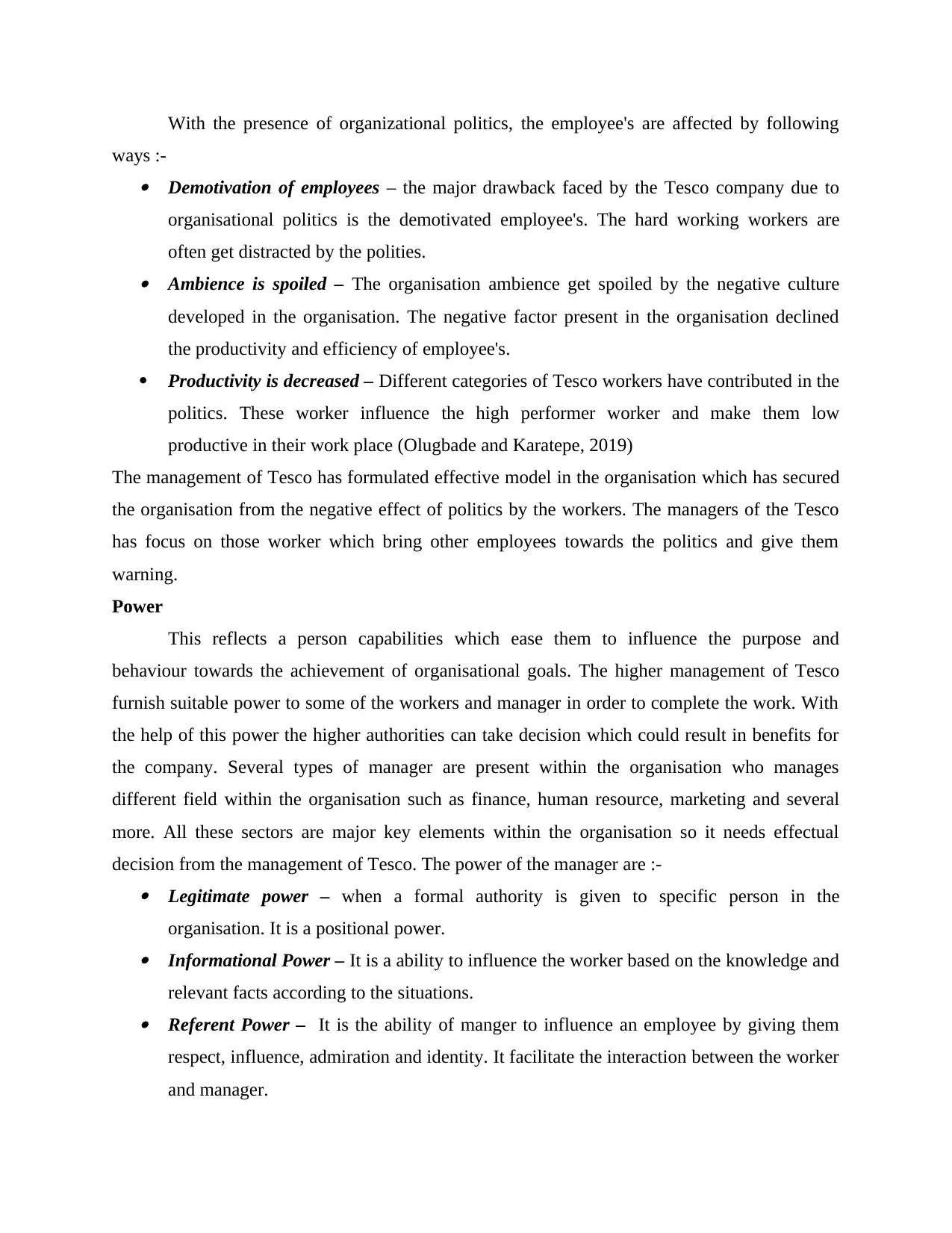
With the presence of organizational politics, the employee's are affected by following
ways :- Demotivation of employees – the major drawback faced by the Tesco company due to
organisational politics is the demotivated employee's. The hard working workers are
often get distracted by the polities. Ambience is spoiled – The organisation ambience get spoiled by the negative culture
developed in the organisation. The negative factor present in the organisation declined
the productivity and efficiency of employee's.
Productivity is decreased – Different categories of Tesco workers have contributed in the
politics. These worker influence the high performer worker and make them low
productive in their work place (Olugbade and Karatepe, 2019)
The management of Tesco has formulated effective model in the organisation which has secured
the organisation from the negative effect of politics by the workers. The managers of the Tesco
has focus on those worker which bring other employees towards the politics and give them
warning.
Power
This reflects a person capabilities which ease them to influence the purpose and
behaviour towards the achievement of organisational goals. The higher management of Tesco
furnish suitable power to some of the workers and manager in order to complete the work. With
the help of this power the higher authorities can take decision which could result in benefits for
the company. Several types of manager are present within the organisation who manages
different field within the organisation such as finance, human resource, marketing and several
more. All these sectors are major key elements within the organisation so it needs effectual
decision from the management of Tesco. The power of the manager are :- Legitimate power – when a formal authority is given to specific person in the
organisation. It is a positional power. Informational Power – It is a ability to influence the worker based on the knowledge and
relevant facts according to the situations. Referent Power – It is the ability of manger to influence an employee by giving them
respect, influence, admiration and identity. It facilitate the interaction between the worker
and manager.
ways :- Demotivation of employees – the major drawback faced by the Tesco company due to
organisational politics is the demotivated employee's. The hard working workers are
often get distracted by the polities. Ambience is spoiled – The organisation ambience get spoiled by the negative culture
developed in the organisation. The negative factor present in the organisation declined
the productivity and efficiency of employee's.
Productivity is decreased – Different categories of Tesco workers have contributed in the
politics. These worker influence the high performer worker and make them low
productive in their work place (Olugbade and Karatepe, 2019)
The management of Tesco has formulated effective model in the organisation which has secured
the organisation from the negative effect of politics by the workers. The managers of the Tesco
has focus on those worker which bring other employees towards the politics and give them
warning.
Power
This reflects a person capabilities which ease them to influence the purpose and
behaviour towards the achievement of organisational goals. The higher management of Tesco
furnish suitable power to some of the workers and manager in order to complete the work. With
the help of this power the higher authorities can take decision which could result in benefits for
the company. Several types of manager are present within the organisation who manages
different field within the organisation such as finance, human resource, marketing and several
more. All these sectors are major key elements within the organisation so it needs effectual
decision from the management of Tesco. The power of the manager are :- Legitimate power – when a formal authority is given to specific person in the
organisation. It is a positional power. Informational Power – It is a ability to influence the worker based on the knowledge and
relevant facts according to the situations. Referent Power – It is the ability of manger to influence an employee by giving them
respect, influence, admiration and identity. It facilitate the interaction between the worker
and manager.
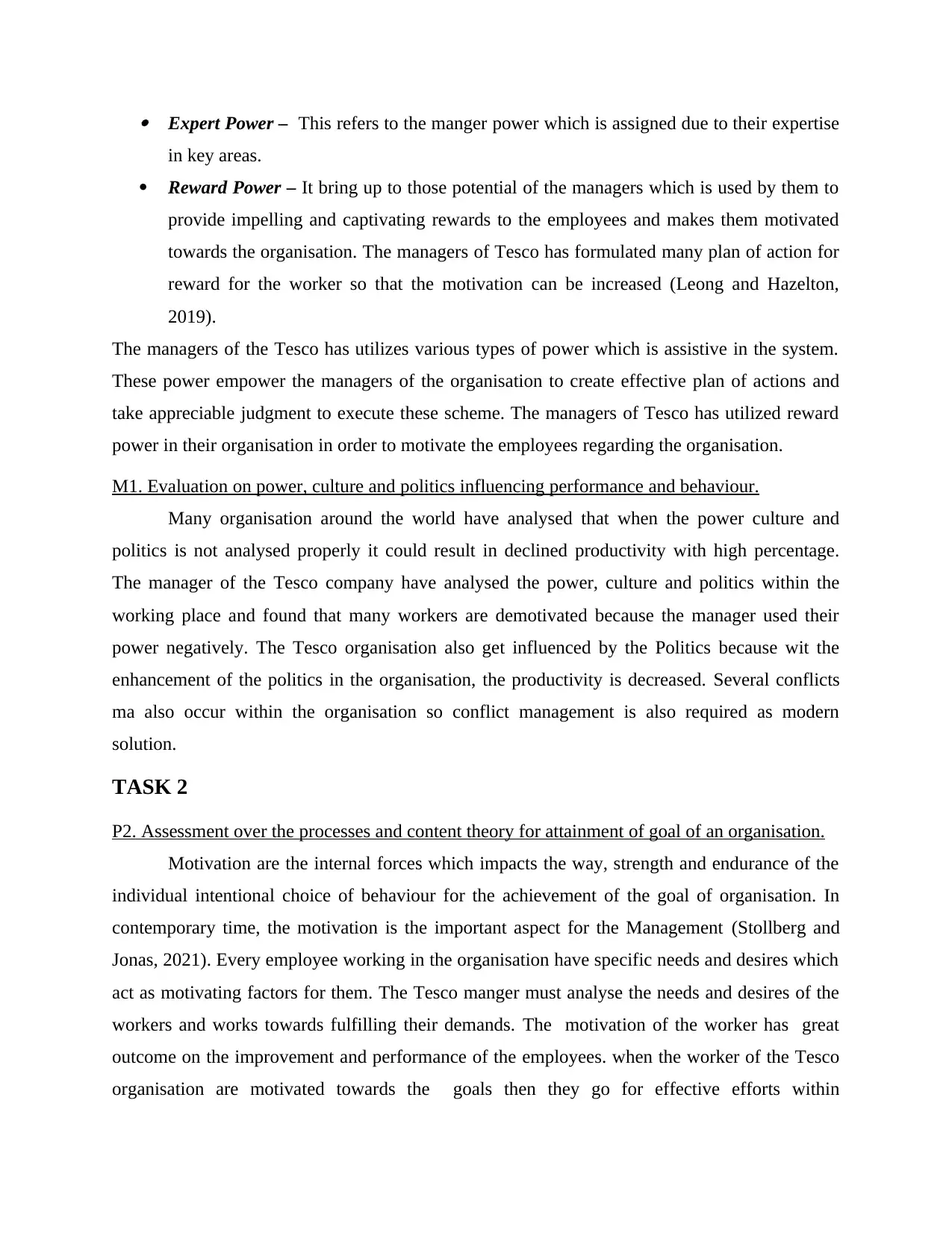
Expert Power – This refers to the manger power which is assigned due to their expertise
in key areas.
Reward Power – It bring up to those potential of the managers which is used by them to
provide impelling and captivating rewards to the employees and makes them motivated
towards the organisation. The managers of Tesco has formulated many plan of action for
reward for the worker so that the motivation can be increased (Leong and Hazelton,
2019).
The managers of the Tesco has utilizes various types of power which is assistive in the system.
These power empower the managers of the organisation to create effective plan of actions and
take appreciable judgment to execute these scheme. The managers of Tesco has utilized reward
power in their organisation in order to motivate the employees regarding the organisation.
M1. Evaluation on power, culture and politics influencing performance and behaviour.
Many organisation around the world have analysed that when the power culture and
politics is not analysed properly it could result in declined productivity with high percentage.
The manager of the Tesco company have analysed the power, culture and politics within the
working place and found that many workers are demotivated because the manager used their
power negatively. The Tesco organisation also get influenced by the Politics because wit the
enhancement of the politics in the organisation, the productivity is decreased. Several conflicts
ma also occur within the organisation so conflict management is also required as modern
solution.
TASK 2
P2. Assessment over the processes and content theory for attainment of goal of an organisation.
Motivation are the internal forces which impacts the way, strength and endurance of the
individual intentional choice of behaviour for the achievement of the goal of organisation. In
contemporary time, the motivation is the important aspect for the Management (Stollberg and
Jonas, 2021). Every employee working in the organisation have specific needs and desires which
act as motivating factors for them. The Tesco manger must analyse the needs and desires of the
workers and works towards fulfilling their demands. The motivation of the worker has great
outcome on the improvement and performance of the employees. when the worker of the Tesco
organisation are motivated towards the goals then they go for effective efforts within
in key areas.
Reward Power – It bring up to those potential of the managers which is used by them to
provide impelling and captivating rewards to the employees and makes them motivated
towards the organisation. The managers of Tesco has formulated many plan of action for
reward for the worker so that the motivation can be increased (Leong and Hazelton,
2019).
The managers of the Tesco has utilizes various types of power which is assistive in the system.
These power empower the managers of the organisation to create effective plan of actions and
take appreciable judgment to execute these scheme. The managers of Tesco has utilized reward
power in their organisation in order to motivate the employees regarding the organisation.
M1. Evaluation on power, culture and politics influencing performance and behaviour.
Many organisation around the world have analysed that when the power culture and
politics is not analysed properly it could result in declined productivity with high percentage.
The manager of the Tesco company have analysed the power, culture and politics within the
working place and found that many workers are demotivated because the manager used their
power negatively. The Tesco organisation also get influenced by the Politics because wit the
enhancement of the politics in the organisation, the productivity is decreased. Several conflicts
ma also occur within the organisation so conflict management is also required as modern
solution.
TASK 2
P2. Assessment over the processes and content theory for attainment of goal of an organisation.
Motivation are the internal forces which impacts the way, strength and endurance of the
individual intentional choice of behaviour for the achievement of the goal of organisation. In
contemporary time, the motivation is the important aspect for the Management (Stollberg and
Jonas, 2021). Every employee working in the organisation have specific needs and desires which
act as motivating factors for them. The Tesco manger must analyse the needs and desires of the
workers and works towards fulfilling their demands. The motivation of the worker has great
outcome on the improvement and performance of the employees. when the worker of the Tesco
organisation are motivated towards the goals then they go for effective efforts within
⊘ This is a preview!⊘
Do you want full access?
Subscribe today to unlock all pages.

Trusted by 1+ million students worldwide
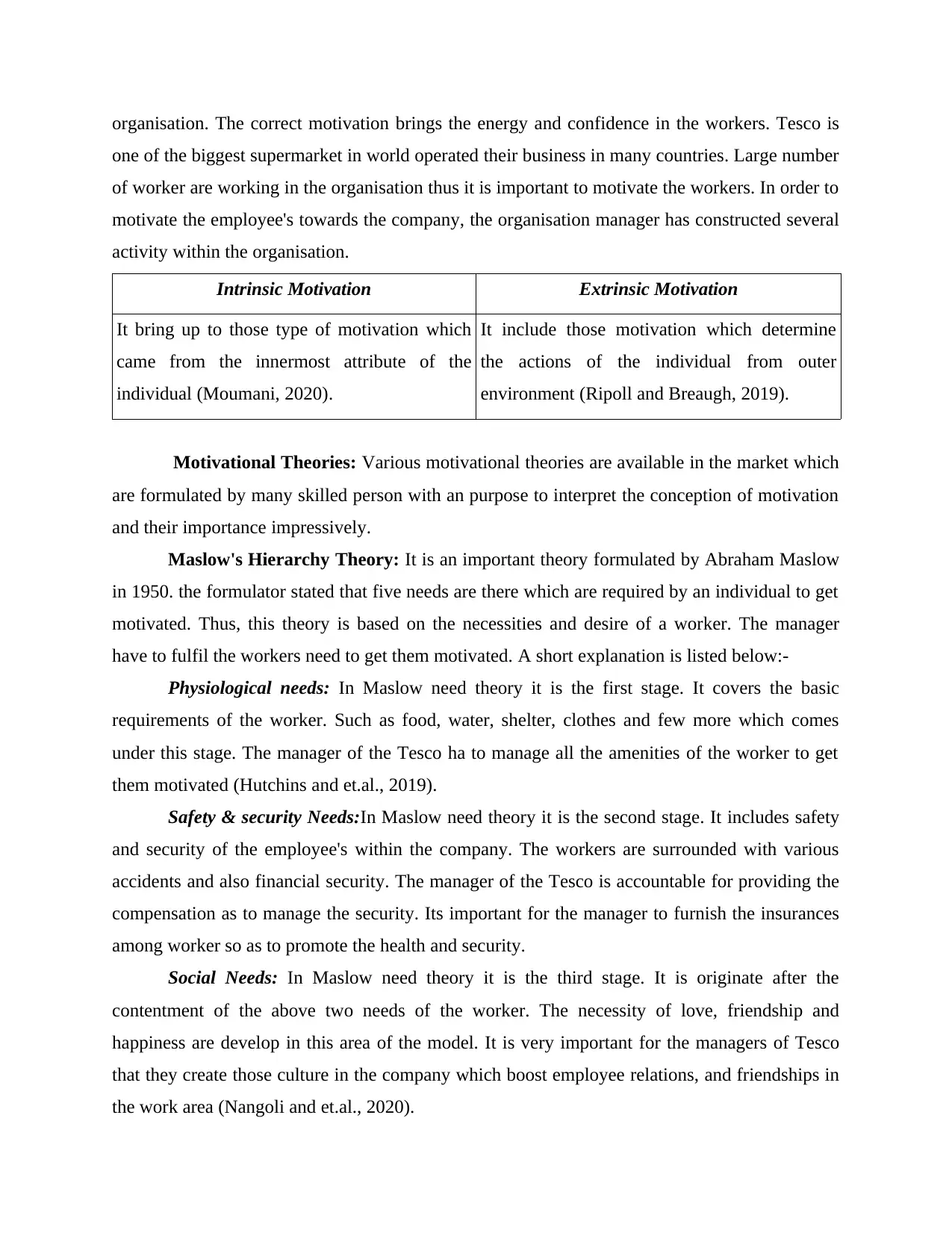
organisation. The correct motivation brings the energy and confidence in the workers. Tesco is
one of the biggest supermarket in world operated their business in many countries. Large number
of worker are working in the organisation thus it is important to motivate the workers. In order to
motivate the employee's towards the company, the organisation manager has constructed several
activity within the organisation.
Intrinsic Motivation Extrinsic Motivation
It bring up to those type of motivation which
came from the innermost attribute of the
individual (Moumani, 2020).
It include those motivation which determine
the actions of the individual from outer
environment (Ripoll and Breaugh, 2019).
Motivational Theories: Various motivational theories are available in the market which
are formulated by many skilled person with an purpose to interpret the conception of motivation
and their importance impressively.
Maslow's Hierarchy Theory: It is an important theory formulated by Abraham Maslow
in 1950. the formulator stated that five needs are there which are required by an individual to get
motivated. Thus, this theory is based on the necessities and desire of a worker. The manager
have to fulfil the workers need to get them motivated. A short explanation is listed below:-
Physiological needs: In Maslow need theory it is the first stage. It covers the basic
requirements of the worker. Such as food, water, shelter, clothes and few more which comes
under this stage. The manager of the Tesco ha to manage all the amenities of the worker to get
them motivated (Hutchins and et.al., 2019).
Safety & security Needs:In Maslow need theory it is the second stage. It includes safety
and security of the employee's within the company. The workers are surrounded with various
accidents and also financial security. The manager of the Tesco is accountable for providing the
compensation as to manage the security. Its important for the manager to furnish the insurances
among worker so as to promote the health and security.
Social Needs: In Maslow need theory it is the third stage. It is originate after the
contentment of the above two needs of the worker. The necessity of love, friendship and
happiness are develop in this area of the model. It is very important for the managers of Tesco
that they create those culture in the company which boost employee relations, and friendships in
the work area (Nangoli and et.al., 2020).
one of the biggest supermarket in world operated their business in many countries. Large number
of worker are working in the organisation thus it is important to motivate the workers. In order to
motivate the employee's towards the company, the organisation manager has constructed several
activity within the organisation.
Intrinsic Motivation Extrinsic Motivation
It bring up to those type of motivation which
came from the innermost attribute of the
individual (Moumani, 2020).
It include those motivation which determine
the actions of the individual from outer
environment (Ripoll and Breaugh, 2019).
Motivational Theories: Various motivational theories are available in the market which
are formulated by many skilled person with an purpose to interpret the conception of motivation
and their importance impressively.
Maslow's Hierarchy Theory: It is an important theory formulated by Abraham Maslow
in 1950. the formulator stated that five needs are there which are required by an individual to get
motivated. Thus, this theory is based on the necessities and desire of a worker. The manager
have to fulfil the workers need to get them motivated. A short explanation is listed below:-
Physiological needs: In Maslow need theory it is the first stage. It covers the basic
requirements of the worker. Such as food, water, shelter, clothes and few more which comes
under this stage. The manager of the Tesco ha to manage all the amenities of the worker to get
them motivated (Hutchins and et.al., 2019).
Safety & security Needs:In Maslow need theory it is the second stage. It includes safety
and security of the employee's within the company. The workers are surrounded with various
accidents and also financial security. The manager of the Tesco is accountable for providing the
compensation as to manage the security. Its important for the manager to furnish the insurances
among worker so as to promote the health and security.
Social Needs: In Maslow need theory it is the third stage. It is originate after the
contentment of the above two needs of the worker. The necessity of love, friendship and
happiness are develop in this area of the model. It is very important for the managers of Tesco
that they create those culture in the company which boost employee relations, and friendships in
the work area (Nangoli and et.al., 2020).
Paraphrase This Document
Need a fresh take? Get an instant paraphrase of this document with our AI Paraphraser
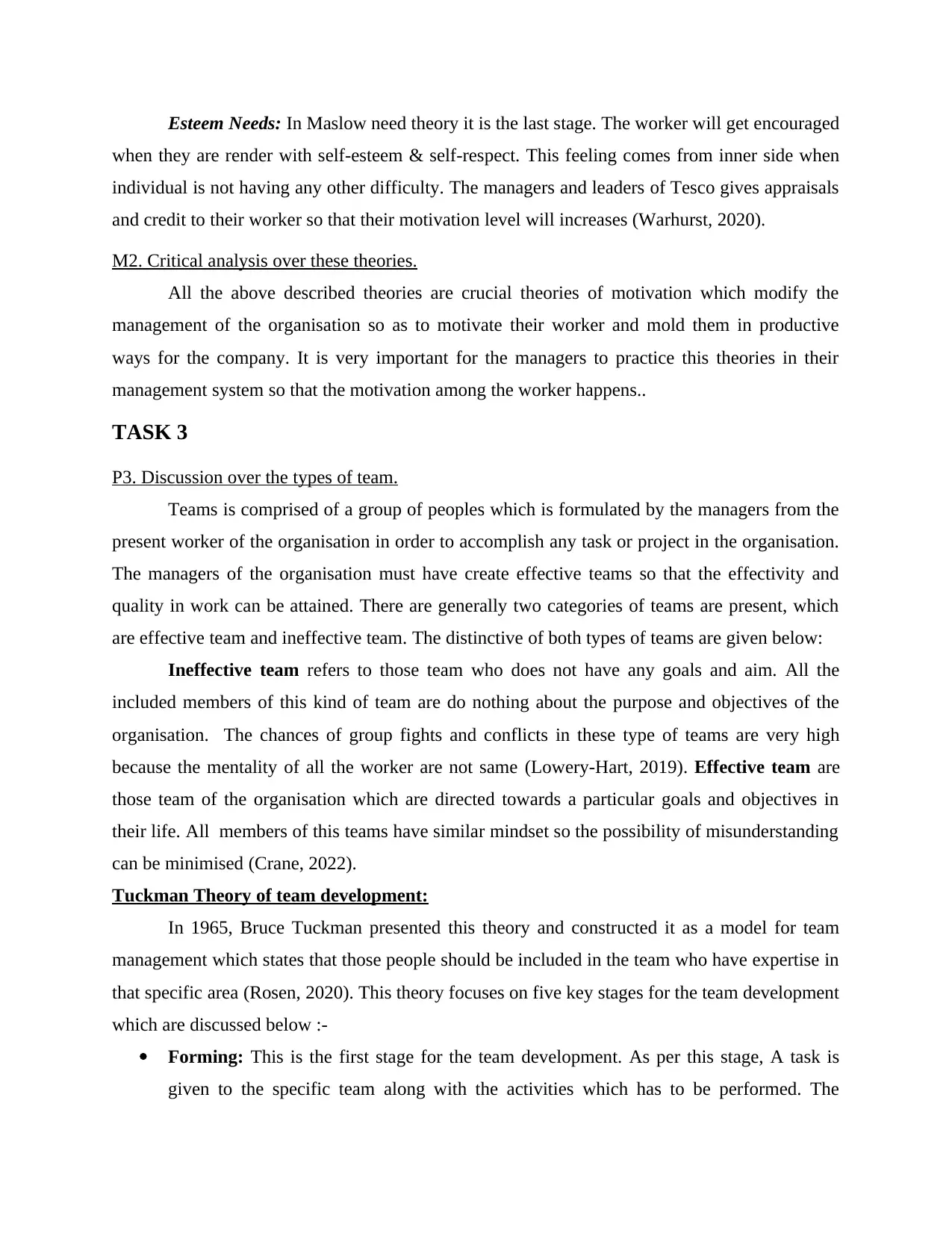
Esteem Needs: In Maslow need theory it is the last stage. The worker will get encouraged
when they are render with self-esteem & self-respect. This feeling comes from inner side when
individual is not having any other difficulty. The managers and leaders of Tesco gives appraisals
and credit to their worker so that their motivation level will increases (Warhurst, 2020).
M2. Critical analysis over these theories.
All the above described theories are crucial theories of motivation which modify the
management of the organisation so as to motivate their worker and mold them in productive
ways for the company. It is very important for the managers to practice this theories in their
management system so that the motivation among the worker happens..
TASK 3
P3. Discussion over the types of team.
Teams is comprised of a group of peoples which is formulated by the managers from the
present worker of the organisation in order to accomplish any task or project in the organisation.
The managers of the organisation must have create effective teams so that the effectivity and
quality in work can be attained. There are generally two categories of teams are present, which
are effective team and ineffective team. The distinctive of both types of teams are given below:
Ineffective team refers to those team who does not have any goals and aim. All the
included members of this kind of team are do nothing about the purpose and objectives of the
organisation. The chances of group fights and conflicts in these type of teams are very high
because the mentality of all the worker are not same (Lowery-Hart, 2019). Effective team are
those team of the organisation which are directed towards a particular goals and objectives in
their life. All members of this teams have similar mindset so the possibility of misunderstanding
can be minimised (Crane, 2022).
Tuckman Theory of team development:
In 1965, Bruce Tuckman presented this theory and constructed it as a model for team
management which states that those people should be included in the team who have expertise in
that specific area (Rosen, 2020). This theory focuses on five key stages for the team development
which are discussed below :-
Forming: This is the first stage for the team development. As per this stage, A task is
given to the specific team along with the activities which has to be performed. The
when they are render with self-esteem & self-respect. This feeling comes from inner side when
individual is not having any other difficulty. The managers and leaders of Tesco gives appraisals
and credit to their worker so that their motivation level will increases (Warhurst, 2020).
M2. Critical analysis over these theories.
All the above described theories are crucial theories of motivation which modify the
management of the organisation so as to motivate their worker and mold them in productive
ways for the company. It is very important for the managers to practice this theories in their
management system so that the motivation among the worker happens..
TASK 3
P3. Discussion over the types of team.
Teams is comprised of a group of peoples which is formulated by the managers from the
present worker of the organisation in order to accomplish any task or project in the organisation.
The managers of the organisation must have create effective teams so that the effectivity and
quality in work can be attained. There are generally two categories of teams are present, which
are effective team and ineffective team. The distinctive of both types of teams are given below:
Ineffective team refers to those team who does not have any goals and aim. All the
included members of this kind of team are do nothing about the purpose and objectives of the
organisation. The chances of group fights and conflicts in these type of teams are very high
because the mentality of all the worker are not same (Lowery-Hart, 2019). Effective team are
those team of the organisation which are directed towards a particular goals and objectives in
their life. All members of this teams have similar mindset so the possibility of misunderstanding
can be minimised (Crane, 2022).
Tuckman Theory of team development:
In 1965, Bruce Tuckman presented this theory and constructed it as a model for team
management which states that those people should be included in the team who have expertise in
that specific area (Rosen, 2020). This theory focuses on five key stages for the team development
which are discussed below :-
Forming: This is the first stage for the team development. As per this stage, A task is
given to the specific team along with the activities which has to be performed. The
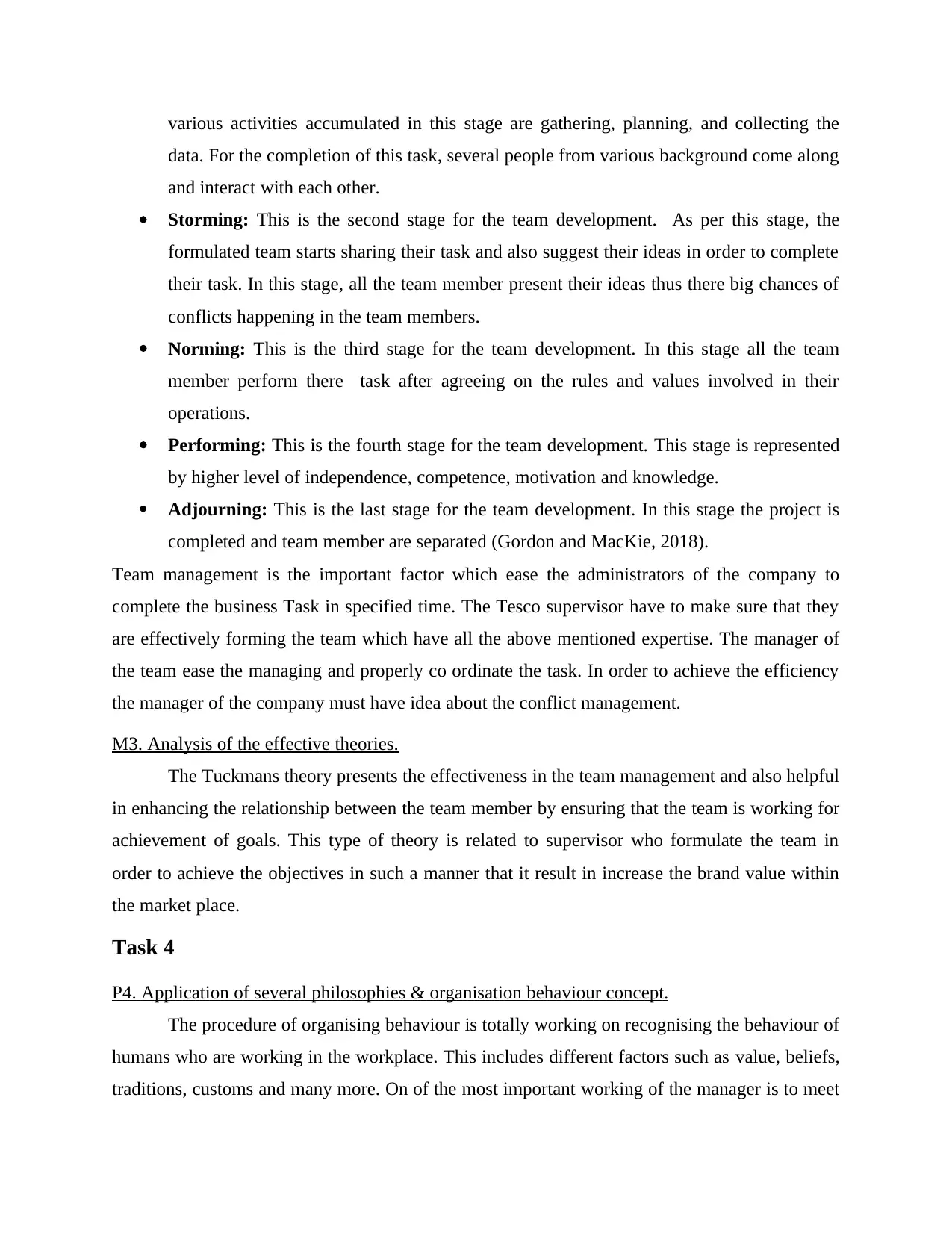
various activities accumulated in this stage are gathering, planning, and collecting the
data. For the completion of this task, several people from various background come along
and interact with each other.
Storming: This is the second stage for the team development. As per this stage, the
formulated team starts sharing their task and also suggest their ideas in order to complete
their task. In this stage, all the team member present their ideas thus there big chances of
conflicts happening in the team members.
Norming: This is the third stage for the team development. In this stage all the team
member perform there task after agreeing on the rules and values involved in their
operations.
Performing: This is the fourth stage for the team development. This stage is represented
by higher level of independence, competence, motivation and knowledge.
Adjourning: This is the last stage for the team development. In this stage the project is
completed and team member are separated (Gordon and MacKie, 2018).
Team management is the important factor which ease the administrators of the company to
complete the business Task in specified time. The Tesco supervisor have to make sure that they
are effectively forming the team which have all the above mentioned expertise. The manager of
the team ease the managing and properly co ordinate the task. In order to achieve the efficiency
the manager of the company must have idea about the conflict management.
M3. Analysis of the effective theories.
The Tuckmans theory presents the effectiveness in the team management and also helpful
in enhancing the relationship between the team member by ensuring that the team is working for
achievement of goals. This type of theory is related to supervisor who formulate the team in
order to achieve the objectives in such a manner that it result in increase the brand value within
the market place.
Task 4
P4. Application of several philosophies & organisation behaviour concept.
The procedure of organising behaviour is totally working on recognising the behaviour of
humans who are working in the workplace. This includes different factors such as value, beliefs,
traditions, customs and many more. On of the most important working of the manager is to meet
data. For the completion of this task, several people from various background come along
and interact with each other.
Storming: This is the second stage for the team development. As per this stage, the
formulated team starts sharing their task and also suggest their ideas in order to complete
their task. In this stage, all the team member present their ideas thus there big chances of
conflicts happening in the team members.
Norming: This is the third stage for the team development. In this stage all the team
member perform there task after agreeing on the rules and values involved in their
operations.
Performing: This is the fourth stage for the team development. This stage is represented
by higher level of independence, competence, motivation and knowledge.
Adjourning: This is the last stage for the team development. In this stage the project is
completed and team member are separated (Gordon and MacKie, 2018).
Team management is the important factor which ease the administrators of the company to
complete the business Task in specified time. The Tesco supervisor have to make sure that they
are effectively forming the team which have all the above mentioned expertise. The manager of
the team ease the managing and properly co ordinate the task. In order to achieve the efficiency
the manager of the company must have idea about the conflict management.
M3. Analysis of the effective theories.
The Tuckmans theory presents the effectiveness in the team management and also helpful
in enhancing the relationship between the team member by ensuring that the team is working for
achievement of goals. This type of theory is related to supervisor who formulate the team in
order to achieve the objectives in such a manner that it result in increase the brand value within
the market place.
Task 4
P4. Application of several philosophies & organisation behaviour concept.
The procedure of organising behaviour is totally working on recognising the behaviour of
humans who are working in the workplace. This includes different factors such as value, beliefs,
traditions, customs and many more. On of the most important working of the manager is to meet
⊘ This is a preview!⊘
Do you want full access?
Subscribe today to unlock all pages.

Trusted by 1+ million students worldwide
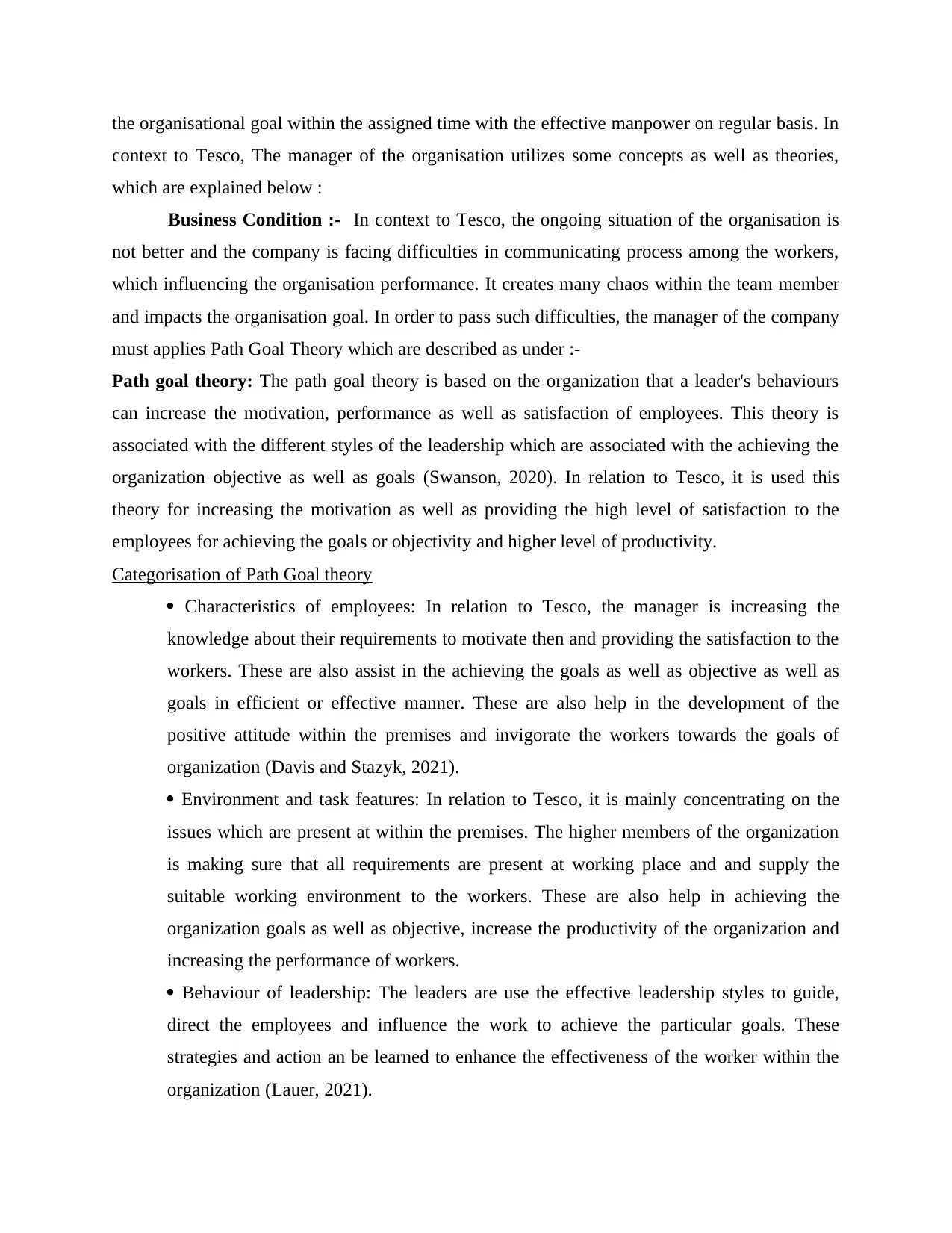
the organisational goal within the assigned time with the effective manpower on regular basis. In
context to Tesco, The manager of the organisation utilizes some concepts as well as theories,
which are explained below :
Business Condition :- In context to Tesco, the ongoing situation of the organisation is
not better and the company is facing difficulties in communicating process among the workers,
which influencing the organisation performance. It creates many chaos within the team member
and impacts the organisation goal. In order to pass such difficulties, the manager of the company
must applies Path Goal Theory which are described as under :-
Path goal theory: The path goal theory is based on the organization that a leader's behaviours
can increase the motivation, performance as well as satisfaction of employees. This theory is
associated with the different styles of the leadership which are associated with the achieving the
organization objective as well as goals (Swanson, 2020). In relation to Tesco, it is used this
theory for increasing the motivation as well as providing the high level of satisfaction to the
employees for achieving the goals or objectivity and higher level of productivity.
Categorisation of Path Goal theory
Characteristics of employees: In relation to Tesco, the manager is increasing the
knowledge about their requirements to motivate then and providing the satisfaction to the
workers. These are also assist in the achieving the goals as well as objective as well as
goals in efficient or effective manner. These are also help in the development of the
positive attitude within the premises and invigorate the workers towards the goals of
organization (Davis and Stazyk, 2021).
Environment and task features: In relation to Tesco, it is mainly concentrating on the
issues which are present at within the premises. The higher members of the organization
is making sure that all requirements are present at working place and and supply the
suitable working environment to the workers. These are also help in achieving the
organization goals as well as objective, increase the productivity of the organization and
increasing the performance of workers.
Behaviour of leadership: The leaders are use the effective leadership styles to guide,
direct the employees and influence the work to achieve the particular goals. These
strategies and action an be learned to enhance the effectiveness of the worker within the
organization (Lauer, 2021).
context to Tesco, The manager of the organisation utilizes some concepts as well as theories,
which are explained below :
Business Condition :- In context to Tesco, the ongoing situation of the organisation is
not better and the company is facing difficulties in communicating process among the workers,
which influencing the organisation performance. It creates many chaos within the team member
and impacts the organisation goal. In order to pass such difficulties, the manager of the company
must applies Path Goal Theory which are described as under :-
Path goal theory: The path goal theory is based on the organization that a leader's behaviours
can increase the motivation, performance as well as satisfaction of employees. This theory is
associated with the different styles of the leadership which are associated with the achieving the
organization objective as well as goals (Swanson, 2020). In relation to Tesco, it is used this
theory for increasing the motivation as well as providing the high level of satisfaction to the
employees for achieving the goals or objectivity and higher level of productivity.
Categorisation of Path Goal theory
Characteristics of employees: In relation to Tesco, the manager is increasing the
knowledge about their requirements to motivate then and providing the satisfaction to the
workers. These are also assist in the achieving the goals as well as objective as well as
goals in efficient or effective manner. These are also help in the development of the
positive attitude within the premises and invigorate the workers towards the goals of
organization (Davis and Stazyk, 2021).
Environment and task features: In relation to Tesco, it is mainly concentrating on the
issues which are present at within the premises. The higher members of the organization
is making sure that all requirements are present at working place and and supply the
suitable working environment to the workers. These are also help in achieving the
organization goals as well as objective, increase the productivity of the organization and
increasing the performance of workers.
Behaviour of leadership: The leaders are use the effective leadership styles to guide,
direct the employees and influence the work to achieve the particular goals. These
strategies and action an be learned to enhance the effectiveness of the worker within the
organization (Lauer, 2021).
Paraphrase This Document
Need a fresh take? Get an instant paraphrase of this document with our AI Paraphraser
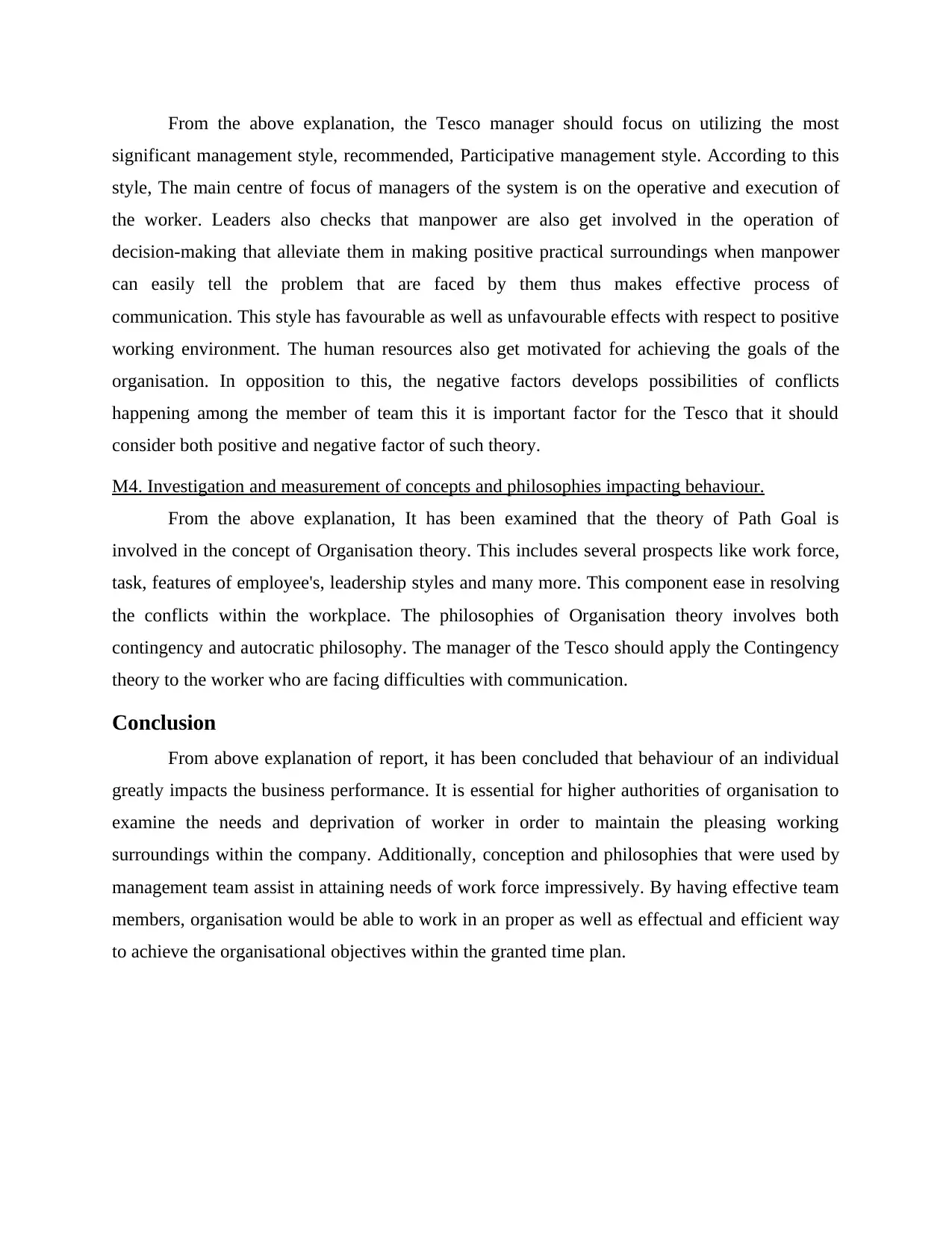
From the above explanation, the Tesco manager should focus on utilizing the most
significant management style, recommended, Participative management style. According to this
style, The main centre of focus of managers of the system is on the operative and execution of
the worker. Leaders also checks that manpower are also get involved in the operation of
decision-making that alleviate them in making positive practical surroundings when manpower
can easily tell the problem that are faced by them thus makes effective process of
communication. This style has favourable as well as unfavourable effects with respect to positive
working environment. The human resources also get motivated for achieving the goals of the
organisation. In opposition to this, the negative factors develops possibilities of conflicts
happening among the member of team this it is important factor for the Tesco that it should
consider both positive and negative factor of such theory.
M4. Investigation and measurement of concepts and philosophies impacting behaviour.
From the above explanation, It has been examined that the theory of Path Goal is
involved in the concept of Organisation theory. This includes several prospects like work force,
task, features of employee's, leadership styles and many more. This component ease in resolving
the conflicts within the workplace. The philosophies of Organisation theory involves both
contingency and autocratic philosophy. The manager of the Tesco should apply the Contingency
theory to the worker who are facing difficulties with communication.
Conclusion
From above explanation of report, it has been concluded that behaviour of an individual
greatly impacts the business performance. It is essential for higher authorities of organisation to
examine the needs and deprivation of worker in order to maintain the pleasing working
surroundings within the company. Additionally, conception and philosophies that were used by
management team assist in attaining needs of work force impressively. By having effective team
members, organisation would be able to work in an proper as well as effectual and efficient way
to achieve the organisational objectives within the granted time plan.
significant management style, recommended, Participative management style. According to this
style, The main centre of focus of managers of the system is on the operative and execution of
the worker. Leaders also checks that manpower are also get involved in the operation of
decision-making that alleviate them in making positive practical surroundings when manpower
can easily tell the problem that are faced by them thus makes effective process of
communication. This style has favourable as well as unfavourable effects with respect to positive
working environment. The human resources also get motivated for achieving the goals of the
organisation. In opposition to this, the negative factors develops possibilities of conflicts
happening among the member of team this it is important factor for the Tesco that it should
consider both positive and negative factor of such theory.
M4. Investigation and measurement of concepts and philosophies impacting behaviour.
From the above explanation, It has been examined that the theory of Path Goal is
involved in the concept of Organisation theory. This includes several prospects like work force,
task, features of employee's, leadership styles and many more. This component ease in resolving
the conflicts within the workplace. The philosophies of Organisation theory involves both
contingency and autocratic philosophy. The manager of the Tesco should apply the Contingency
theory to the worker who are facing difficulties with communication.
Conclusion
From above explanation of report, it has been concluded that behaviour of an individual
greatly impacts the business performance. It is essential for higher authorities of organisation to
examine the needs and deprivation of worker in order to maintain the pleasing working
surroundings within the company. Additionally, conception and philosophies that were used by
management team assist in attaining needs of work force impressively. By having effective team
members, organisation would be able to work in an proper as well as effectual and efficient way
to achieve the organisational objectives within the granted time plan.
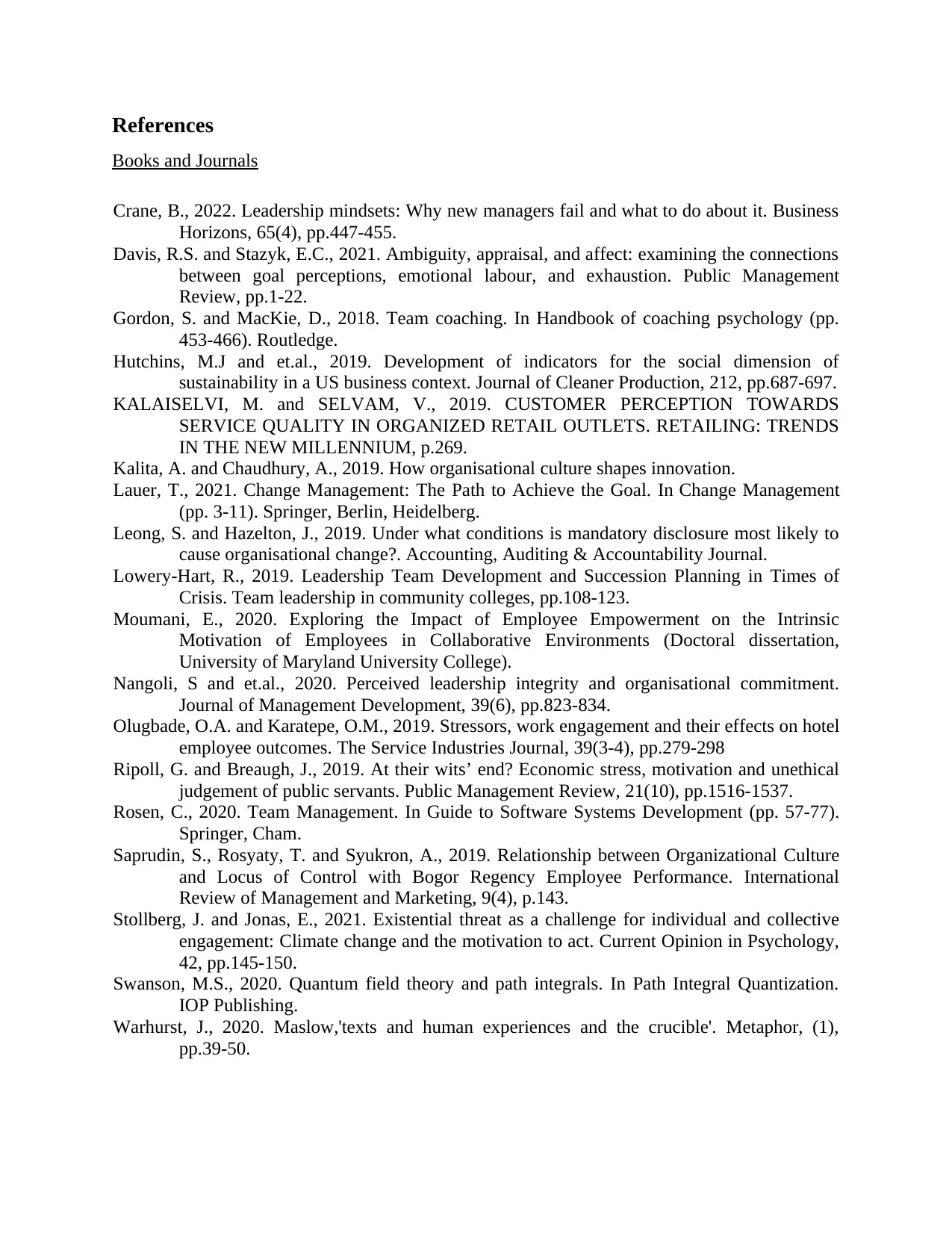
References
Books and Journals
Crane, B., 2022. Leadership mindsets: Why new managers fail and what to do about it. Business
Horizons, 65(4), pp.447-455.
Davis, R.S. and Stazyk, E.C., 2021. Ambiguity, appraisal, and affect: examining the connections
between goal perceptions, emotional labour, and exhaustion. Public Management
Review, pp.1-22.
Gordon, S. and MacKie, D., 2018. Team coaching. In Handbook of coaching psychology (pp.
453-466). Routledge.
Hutchins, M.J and et.al., 2019. Development of indicators for the social dimension of
sustainability in a US business context. Journal of Cleaner Production, 212, pp.687-697.
KALAISELVI, M. and SELVAM, V., 2019. CUSTOMER PERCEPTION TOWARDS
SERVICE QUALITY IN ORGANIZED RETAIL OUTLETS. RETAILING: TRENDS
IN THE NEW MILLENNIUM, p.269.
Kalita, A. and Chaudhury, A., 2019. How organisational culture shapes innovation.
Lauer, T., 2021. Change Management: The Path to Achieve the Goal. In Change Management
(pp. 3-11). Springer, Berlin, Heidelberg.
Leong, S. and Hazelton, J., 2019. Under what conditions is mandatory disclosure most likely to
cause organisational change?. Accounting, Auditing & Accountability Journal.
Lowery-Hart, R., 2019. Leadership Team Development and Succession Planning in Times of
Crisis. Team leadership in community colleges, pp.108-123.
Moumani, E., 2020. Exploring the Impact of Employee Empowerment on the Intrinsic
Motivation of Employees in Collaborative Environments (Doctoral dissertation,
University of Maryland University College).
Nangoli, S and et.al., 2020. Perceived leadership integrity and organisational commitment.
Journal of Management Development, 39(6), pp.823-834.
Olugbade, O.A. and Karatepe, O.M., 2019. Stressors, work engagement and their effects on hotel
employee outcomes. The Service Industries Journal, 39(3-4), pp.279-298
Ripoll, G. and Breaugh, J., 2019. At their wits’ end? Economic stress, motivation and unethical
judgement of public servants. Public Management Review, 21(10), pp.1516-1537.
Rosen, C., 2020. Team Management. In Guide to Software Systems Development (pp. 57-77).
Springer, Cham.
Saprudin, S., Rosyaty, T. and Syukron, A., 2019. Relationship between Organizational Culture
and Locus of Control with Bogor Regency Employee Performance. International
Review of Management and Marketing, 9(4), p.143.
Stollberg, J. and Jonas, E., 2021. Existential threat as a challenge for individual and collective
engagement: Climate change and the motivation to act. Current Opinion in Psychology,
42, pp.145-150.
Swanson, M.S., 2020. Quantum field theory and path integrals. In Path Integral Quantization.
IOP Publishing.
Warhurst, J., 2020. Maslow,'texts and human experiences and the crucible'. Metaphor, (1),
pp.39-50.
Books and Journals
Crane, B., 2022. Leadership mindsets: Why new managers fail and what to do about it. Business
Horizons, 65(4), pp.447-455.
Davis, R.S. and Stazyk, E.C., 2021. Ambiguity, appraisal, and affect: examining the connections
between goal perceptions, emotional labour, and exhaustion. Public Management
Review, pp.1-22.
Gordon, S. and MacKie, D., 2018. Team coaching. In Handbook of coaching psychology (pp.
453-466). Routledge.
Hutchins, M.J and et.al., 2019. Development of indicators for the social dimension of
sustainability in a US business context. Journal of Cleaner Production, 212, pp.687-697.
KALAISELVI, M. and SELVAM, V., 2019. CUSTOMER PERCEPTION TOWARDS
SERVICE QUALITY IN ORGANIZED RETAIL OUTLETS. RETAILING: TRENDS
IN THE NEW MILLENNIUM, p.269.
Kalita, A. and Chaudhury, A., 2019. How organisational culture shapes innovation.
Lauer, T., 2021. Change Management: The Path to Achieve the Goal. In Change Management
(pp. 3-11). Springer, Berlin, Heidelberg.
Leong, S. and Hazelton, J., 2019. Under what conditions is mandatory disclosure most likely to
cause organisational change?. Accounting, Auditing & Accountability Journal.
Lowery-Hart, R., 2019. Leadership Team Development and Succession Planning in Times of
Crisis. Team leadership in community colleges, pp.108-123.
Moumani, E., 2020. Exploring the Impact of Employee Empowerment on the Intrinsic
Motivation of Employees in Collaborative Environments (Doctoral dissertation,
University of Maryland University College).
Nangoli, S and et.al., 2020. Perceived leadership integrity and organisational commitment.
Journal of Management Development, 39(6), pp.823-834.
Olugbade, O.A. and Karatepe, O.M., 2019. Stressors, work engagement and their effects on hotel
employee outcomes. The Service Industries Journal, 39(3-4), pp.279-298
Ripoll, G. and Breaugh, J., 2019. At their wits’ end? Economic stress, motivation and unethical
judgement of public servants. Public Management Review, 21(10), pp.1516-1537.
Rosen, C., 2020. Team Management. In Guide to Software Systems Development (pp. 57-77).
Springer, Cham.
Saprudin, S., Rosyaty, T. and Syukron, A., 2019. Relationship between Organizational Culture
and Locus of Control with Bogor Regency Employee Performance. International
Review of Management and Marketing, 9(4), p.143.
Stollberg, J. and Jonas, E., 2021. Existential threat as a challenge for individual and collective
engagement: Climate change and the motivation to act. Current Opinion in Psychology,
42, pp.145-150.
Swanson, M.S., 2020. Quantum field theory and path integrals. In Path Integral Quantization.
IOP Publishing.
Warhurst, J., 2020. Maslow,'texts and human experiences and the crucible'. Metaphor, (1),
pp.39-50.
⊘ This is a preview!⊘
Do you want full access?
Subscribe today to unlock all pages.

Trusted by 1+ million students worldwide
1 out of 12
Related Documents
Your All-in-One AI-Powered Toolkit for Academic Success.
+13062052269
info@desklib.com
Available 24*7 on WhatsApp / Email
![[object Object]](/_next/static/media/star-bottom.7253800d.svg)
Unlock your academic potential
Copyright © 2020–2026 A2Z Services. All Rights Reserved. Developed and managed by ZUCOL.




